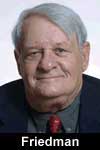Saul Friedman: What Hath Deregulation Wrought?
Posted at 6:25 pm, September 29th, 2008
Anyone think there are too many commercials on network television, and that some of them cross the line of decency and good taste? It wasn’t always that way. Or do you think that all those commercials for this drug or that one are unseemly and possibly dangerous? That wasn’t always permitted. Are you as confident as you once were that the Food and Drug Administration’s approval meant that drugs were are and effective? The recent record says otherwise.
Do you sometimes wonder why some television commentators can get away with such scurrilous, personal and libelous attacks? That wasn’t always so. And are you sure that your airline reservation will be honored at the price and with the seating you expected or even that the airline will still be in business when you get to the airport? Not too long ago flying was more predictable, convenient and even enjoyable.
Chalk all these issues up to three decades of a magic potion called deregulation, which most of us in the press lapped up without protest. Get rid of government interference and let the market go free and America will have a new birth of freedom. Airlines in 1978, broadcasting in 1981, the crippling of the Food and Drug Administration by Newt Gingrich and company in the 1990s. I asked economist Dean Baker, of the Center for Economic and Policy Research, if he remembers if the press – aside from reporting on deregulation – put up much of a fuss. “I don’t remember anything,” said Baker, who has been around Washington for a long time.
Not to blow my own horn but among the last stories I did for Newsday before I began my column was a series on Gingrich’s efforts to reform the FDA into uselessness. I even went to visit and interview the sainted FDA researcher Dr. Frances O. Kelsey, who helped my Nieman Watchdog colleague, Morton Mintz, expose the horrors of the drug Thalidomide and prevent its sale in the U.S. Kelsey warned that day that the changes Gingrich wanted – and got – would produce more deadly drugs. She was right. But that’s the price we pay for a free market. It was a nice story, but it went nowhere and hastened my decision to leave daily journalism to write my column.
Now, suddenly deregulation is a big story. And the press is all atwitter discovering that the deregulation that most of the press ignored and most financial reporters celebrated, has come back to bite the market in its bare rear. Reporters had to look up the Emergency Banking Act of 1933, known as Glass-Steagall, which created a wall between commercial and investment banking. Under the law, passed in the earliest days of the New Deal, commercial banks could not gamble with depositors’ money in the way investment banks gamble with investors’ money.
The wall came down in 1999 because, according to most commentators, it was old-fashioned, no-longer needed, and got in the way of modern, chain banking and global competition. Glass-Steagall had outlived its usefulness, the experts told the compliant press. Even so, the bill, sponsored by three Republicans, Sen. Phil Gramm of Texas, James Leach of Iowa, and Thomas Bliley of Virginia, survived at 54-44 vote in the Senate, with virtually every Democrat voting no. It had overwhelming support in the Republican House, and who could argue with it – It was backed by then Treasury Secretary Robert Rubin and his top assistant, Lawrence Summers, both Democrats, as well as Alan Greenspan. The conference report sailed through the Congress and the death certificate of banking regulation was signed by President Clinton who had proclaimed, to an approving press, “The era of big government is over.”
Recently, SEC Chairman Christopher Cox, who had been a fan of deregulation, acknowledged that the “voluntary regulation” that replaced Glass-Steagall does not work. As far as I can tell, he is the only financial guru in the midst of the current mess who acknowledges he had been wrong. No one in the press has asked Gramm or Rubin or Summers or Greenspan if they had any regrets over the death of Glass-Steagall. It’s also a fair question to be asked of Sen. John McCain, who voted for it, and for a subsequent measure in 2000 by his friend, Gramm, to exclude from regulation under the Commodity Exchange Act of 1936 the “credit default swaps” and other exotic securities that helped cause the current credit collapse. “Perhaps no deregulatory effort had more catastrophic effect,”said the New York Times on Sept. 28. Yet I couldn’t find any contemporary discussion of the law.
Surely the mainstream press will now be moved dig a bit into the disastrous results of deregulation, not only in the financial services industry but elsewhere, where the free market has not served the nation well. Why do we need airline failures; does it make flying safer? And should we not have greater confidence in drugs and drug advertising that invents new illnesses? Otherwise we shall not learn anything from this crisis. The press, too often, seems not to learn from history; it makes the same mistakes over and over again.
Perhaps Jon Stewart was right when he noted recently on the “Daily Show,” “Those who do not study the past get an exciting opportunity to repeat it.”




